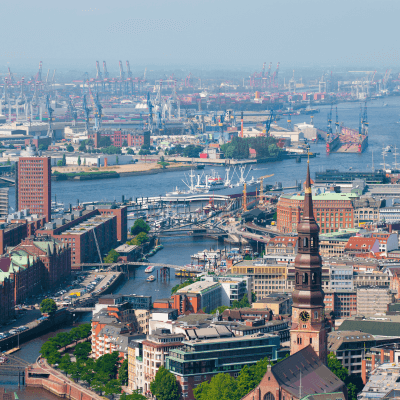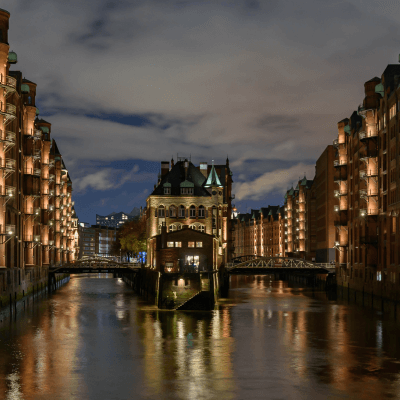Please note: The website audio only has the German text, no sentence-by-sentence English translation. The English version is available as a complete text below. At the very bottom of the text you will see buttons that give you the possibility to download a bilingual PDF, a PDF with the German text plus an English vocabulary list, a worksheet and an mp3 file.
Deutsch
Es ist 18 Uhr. Luise hat das Abendessen vorbereitet. Ihre Enkelin Jana hat geholfen. Sie haben Spaghetti Bolognese gekocht. Jana liebt Spaghetti. Alle essen zusammen bei Luises Eltern Friedrich und Margarethe im Erdgeschoss. Margarethe hat schon die Teller auf den Tisch gestellt.
„Sag deinen Eltern Bescheid“, sagt Luise zu Jana.
Jana läuft in den zweiten Stock und kommt ein paar Minuten später mit ihrer Mutter Paula und ihrem Vater Joachim zurück. Paula ist Luises jüngste Tochter.
„Wie war euer Tag?“, fragt Luise.
„Viel Arbeit, wie immer“, antwortet Joachim. Er arbeitet als Ingenieur am Hamburger Hafen. Es ist eine interessante Arbeit und er bekommt ein gutes Gehalt.
„Mein Tag war interessant“, sagt Paula. „Wir bereiten eine Lesereise mit einem Autor aus Mexiko vor.“ Paula arbeitet bei einem Verlag. Sie betreut Autoren aus Lateinamerika, wenn sie nach Deutschland kommen. Paula spricht sehr gut Spanisch und Portugiesisch.
Nach dem Essen schaltet Margarethe den Fernseher an. Um 19 Uhr schaut sie die Nachrichtensendung heute. Das ist Tradition. Die Sendung gibt es seit 1963 und sie dauert immer 20 Minuten.
Nach den Nachrichten darf Jana noch eine Stunde in ihrem Zimmer spielen. Dann muss sie schlafen. Ihre Eltern setzen sich ins Wohnzimmer und schauen einen Film auf Netflix. Luise hingegen liest abends lieber ein Buch. Margarethe und Friedrich schauen fern.
English
It is 6 pm. Luise has prepared dinner. Her granddaughter Jana helped. They cooked spaghetti bolognese. Jana loves spaghetti. They all eat together at Luise’s parents Friedrich and Margarethe on the ground floor. Margarethe already put the plates on the table.
„Tell your parents (to come down)”, Luise says to Jana.
Jana runs to the second floor and a few minutes later, she comes back with her mother Paula and her father Joachim. Paula is Luise’s youngest daughter.
„What was your day like?“, Luise asks.
„A lot of work, as always”, Joachim answers. He works as an engineer at the port of Hamburg. It’s an interesting work and he earns/gets a good salary.
„My day was interesting“, says Paula. „We are preparing a reading tour with an author from Mexico.” Paula works for a publishing house. She accompanies authors from Latin America when they come to Germany. Paula speaks Spanish and Portuguese very well.
After dinner, Margarethe turns on the tv. At 7 pm, she watches the news program heute. That’s a tradition. The program has been broadcasted since 1963 and always lasts 20 minutes.
After the news, Jana is allowed to play in her room for another hour. Then, she has to sleep. Her parents sit down in the living room and watch a movie on Netflix. Luise, on the other hand, prefers to read a book in the evenings. Margarethe and Friedrich watch tv.
Language Insights
Bescheid sagen - to let know/to inform
- Sag mir Bescheid, wann du Zeit hast.
- Ich sage ihm Bescheid, dass wir um 16 Uhr kommen.
- Wir müssen ihnen Bescheid sagen, dass wir das Hotel reserviert haben.
“Bescheid sagen” is a very common expression. The English “let me know” is usually translated to “Sag mir Bescheid” although “Lass es mich wissen” is also possible.
Verb + lieber - to prefer/rather
- Luise liest abends lieber. / Luise prefers to read in the evening.
- Ich höre lieber Podcasts als Musik. / I rather listen to podcasts than to music.
- Möchtest du lieber nach Berlin oder nach München fahren? / Would you rather go to Berlin or to Munich?
We have a verb “bevorzugen” = “to prefer” but it’s not commonly used and sounds a bit formal.
Cultural Insights
The port of Hamburg is the largest port of Germany and the third largest in Europe (after Rotterdam/Netherlands and Antwerp/Belgium). Its origins go back to the 9th century and the construction of the modern port as we know it today started in the middle of the 19th century. Nowadays, parts of the port and especially the “Speicherstadt” (‘warehouse city’) are tourist attractions.


